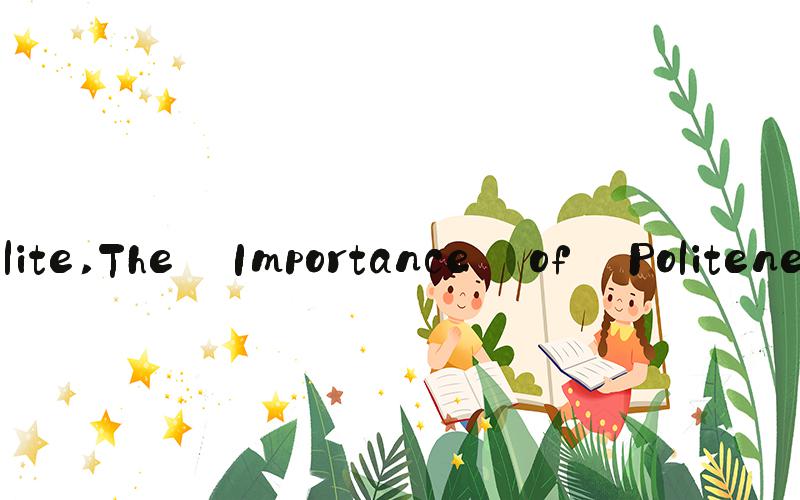AI答案
 How to be Polite in All Situations
How to be Polite in All SituationsBeing polite is a virtue that is highly valued in all cultures and societies. It is an essential ingredient for building and maintaining healthy relationships, creating a positive atmosphere, and practicing good manners and etiquette. Politeness is not just about following a set of rules, but it is also about showing genuine consideration and respect for others. In this article, we will explore how to be polite in all situations and why it matters.
The Importance of PolitenessPoliteness is important because it creates a sense of harmony and respect in our interactions with others. It allows us to communicate effectively and empathetically, and to avoid misunderstandings and conflict. Being polite helps to build trust and positive relationships, which are key to personal and professional success. Politeness also reflects positively on our character, demonstrating our values and ethics, and setting us apart from those who are rude or disrespectful.
Politeness in CommunicationPoliteness in communication involves paying attention to tone, word choice, and body language when interacting with others. It is important to be respectful, thoughtful, and considerate of the other person's feelings and opinions. This can be accomplished through active listening, asking questions, avoiding interrupting, and avoiding the use of offensive language or derogatory terms. Using please, thank you, and sorry, can also go a long way in showing politeness in communication.
Politeness in Social SettingsPoliteness in social settings requires understanding and respecting social norms and etiquette. It is important to dress appropriately, be punctual, and show interest in others. When dining with others, it is polite to wait for everyone to be served before beginning to eat, and to use utensils and napkins properly. In social settings, it is also important to avoid overstepping boundaries, being too familiar, or discussing sensitive topics that could offend others.
Politeness in the WorkplacePoliteness in the workplace includes respect for colleagues, superiors, and clients. It is important to communicate professionally, be punctual, and meet deadlines. It is also important to avoid gossip, office politics, or creating unnecessary drama. Being polite in the workplace can help to create a positive environment, increase productivity, and build credibility and trust.
Politeness in Conflicts and DisagreementsEven in conflicts and disagreements, it is important to maintain politeness and respect toward others. This includes avoiding personal attacks, using a calm and rational tone, and seeking to understand the other person's perspective. It can also be helpful to find common ground, compromise, and apologize when necessary. By maintaining a polite and respectful approach, it is possible to resolve conflicts and disagreements without tarnishing relationships or causing unnecessary harm.
ConclusionBeing polite is a simple but powerful way to enhance our relationships, improve our communication, and demonstrate our character and values. It requires effort and practice, but the benefits are well worth it. By being polite in all situations, we can create a more harmonious and respectful world, one interaction at a time.
